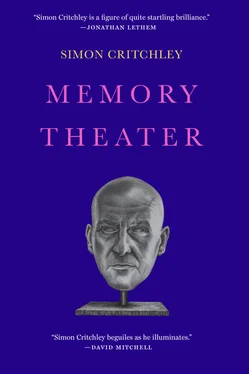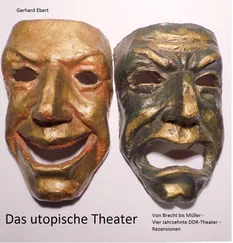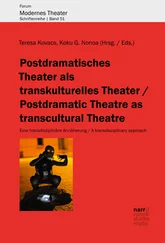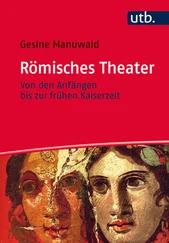Following his excommunication in Italy and an accusation of murder, Bruno settled for a time in Paris, London, Oxford, and various university towns in Germany. In 1591, he made the fatal move of returning to Italy, where he was tried for heresy, briefly in Venice and for seven long years in Rome. After being condemned to death for refusing to retract his views, he famously said to his judges, “Perhaps your fear in passing judgment on me is greater than mine in receiving it.” He was gagged and burned alive on the Campo de’ Fiori. Bruno has also always been seen as the dissenting enemy of a repressive Catholic Church. In many small Italian towns the Piazza Giordano Bruno stands directly opposite the main Catholic Church, often at the initiative of the local communist party.
Bruno was the Simon Magus figure of a Hermetic tradition of the arts of memory. In Frances Yates’s words, its central doctrine is, “All is in all in nature. So in the intellect all is in all. And memory can memorize all in all.” Through techniques of memory, the human being can achieve absolute knowledge and become divine. For Bruno, to understand is to speculate with images, where the human mind is the mirror of the cosmos which functions through powerful, proto-Jungian archetypes. Through the divine power of the imagination, the intellect can seize hold of the whole.
Bruno’s art of memory is enshrined in texts like Torch of the Thirty Statues from 1588, where towering mythological statues embody a Michelangelesque memory: Apollo, naked in his chariot, his head nimbed with solar rays, is the Monad or One; Saturn, brandishing his sickle, is the Beginning or Time; Minerva is the divine in man reflecting the divine universe; the infigurable Orcus or Abyss signifies the thirst for divine infinity.
Bruno was an occupant of the French embassy in London between 1583 and 1586, the key years for the inception of the English poetic renaissance, ushered in by Fulke Greville, Sir Philip Sidney, and his group. These people were close to Bruno during his London years and he also met with John Dee, the Hermetic philosopher and astrologer to Queen Elizabeth, who was the teacher of Sidney and Greville. Indeed, some believe that Greville was the author of plays attributed to Shakespeare, some of which were lost. Although such speculations are dubious, there is documentary evidence connecting Greville to Shakespeare and indeed mentioning that the former was the latter’s “master” (they both hailed from Warwickshire). Maybe the young Will found admittance into the circles of the Hermetic art of memory.
Such speculations find some anchor in history if we consider the writings of another Hermetic philosopher of the period, Robert Fludd. One of Yates’s most far-reaching contentions in The Art of Memory is that the memory space described in Fludd’s obscure treatises on the two worlds (the Utriusque Cosmi ), and which he describes as “public theaters,” may reflect or even anticipate the circular architecture of Shakespeare’s Globe Theatre.
Is it not at least plausible to speculate that the Globe Theatre, with its heavens over part of the stage, complete with zodiacal symbols, was not some adapted bear pit or inn yard, as is commonly thought, but an elaborate and geometrically exacting theater of memory, a kind of machine for recalling the whole, a mortal portal for touching the divine, a microcosm for the cosmic macrocosm. Shakespearean theater might thus be the continuation of ancient and Renaissance traditions of the art of memory, a concrete building that embodied the operations of occult memory. If “all the world’s a stage,” then the theater is the stage of the world itself: its mirror and key.
The wilder excessesof Yates’s book fascinated me in the mid-1980s, as they had attracted Michel in the late 1960s. For example, the idea that there might be a connection between the “Giordanisti” (the followers of Bruno) and the Rosicrucians, the mysterious brotherhood of the Rosy Cross announced by manifestos published in Germany in the early 1600s and who might never have existed, and with the Freemasons, who first surface in 1646 in England. Indeed, the speculative masonry of this cult, with its emphasis on architecture and building, is also a tributary of the art of memory.
Yates ends her book by claiming that the art of memory does not disappear with Elizabethan theater, but reappears in a more secular and respectable guise in the various seventeenth-century projects for an encyclopedia of knowledge that would reflect the world and make it available to memory. We find such projects in Bacon, Descartes, and Leibniz — indeed, Leibniz took over from Bruno the concept of the “monad,” the simplest substance or unit of existence out of which the entire universe was constructed.
The seventeenth-century fascination with the idea of a universal language, stimulated by Bacon’s demand for “real characters” for expressing notions, comes straight out of the tradition of the art of memory and is a rationalization of the occult and magical memory images of Bruno. This led to Leibniz’s plans for a “characteristica”: a system of universal signs based on the invention of infinitesimal calculus, a kind of modern hieroglyphics, an attempted recovery of the language of Adam against the Babel of the world. These signs would be placed onto a vast combinatorial machine, a proto-computer, the calculations of which would provide all possible permutations of the knowable.
As with Camillo’s stupendous memory theater, Leibniz never completed his plan for the universal characteristic and ended his life in failure, an unwanted and ignored courtier abandoned by his patron, Duke Georg Ludwig, who went off to become King George I of England in 1714, leaving Leibniz in Hannover. But their hybris lives on in the idea of a universal key, a clavis universalis , that will unlock the secrets of nature, an arcane encyclopedia that would arrive at universal knowledge through the right combination of the constituent, abstracted features of reality. And what subtends this desire for an encyclopedia, Yates contends, is an ecumenical drive for an ethic of universal love and charity that would overcome all the religious differences that lead to intolerance and war, a kind of Rosicrucian effort at a universal reformation of man, the occult humanist strand at the heart of the Northern European Enlightenment.
Michel’ssimple but brilliant idea was to read Hegel’s Phenomenology of Spirit as a memory theater, namely as a continuation of Yates’s tradition of the art of memory. The main protagonist in Hegel’s book — the book that nearly ruined my life when I first read it when I was twenty-three (I thought it was too incontestably true and it ruined everything else I read) — is a personage called Geist or Spirit. By Spirit, Hegel means no less than the entire cultural development of the world. His basic thought is that Spirit requires a series of appearances or phenomena in arresting, dramatic, and memorable images. These images, or what Hegel calls “shapes,” by which world history is traced as if in silhouette, have to be seized by the self and made our own. The stated goal of Hegel’s philosophy is that substance becomes subject: namely, that the knowledge of the whole which exists externally in its historical movement has to be grasped internally by the self. This is the process of education whereby a self ascends to an experience of self-determination.
This grasping of the whole is what Hegel calls “absolute knowledge,” and he insists that this is possible only as recollection. This is why Hegel fills his book with vivid and indeed bloody images, such as the life-and-death struggle between master and slave, the unhappy consciousness, the vapidly legislating Stoic, the beautiful soul made mad by the world, and the terroristic reign of virtue in the French Revolution, where death had no more meaning than cutting the head off a cabbage or swallowing a gulp of water. Hegel’s pages are full of exaggerated and powerfully visual images, aids to recollection, like Bruno’s statues or the icons in the seats of Camillo’s theater. The Phenomenology of Spirit is a memory theater where the long path of the world’s historical development can be held in the storehouse of memory and obsessively replayed. Hegel insists that the movement of Spirit is the circle that returns into itself, a circle that presupposes its beginning and reaches it only at the end. The theater of Spirit is a globe.
Читать дальше












